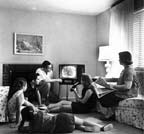


Television
is an accepted part of modern American life. The poorest pauper often owns
a TV. The dwelling may be a tent, a tar-paper shack, or a tenement house,
but there is usually a television.
The family may not own a car or have a bathtub, but they must have a television.
Children may not have clothes, the baby may not have milk, the husband may
not have a job, the mother may not have medical attention—but they have
a television.
In society where a a television set has become a basic necessity instead of
an expensive luxury, a man who says he does not have a television is regarded
incredulously and sometimes with suspicion. What kind of a person would not
have a television? He is considered some sort of maladjusted freak who would
admit such a nonconformity to the ideals of society. He is accused of being
woefully ignorant of world events, culturally deprived, and guilty of cruelty
to his children, who are missing one life’s choicest blessings.
At the risks of being misunderstood, ridiculed, pitied, criticized, and even
persecuted, this writer is going to admit that he does not have a television.
Futhermore, he intends to compound the consternation by trying to defend his
status as a non-owner. At the risk of being thought mad, he is even going
to suggest that having no television is a more logical, holier, and happier
state than that of the tube owner.
To establish
my claim to sanity, let me acknowledge several points.
Television is here to stay. I do not propose to rid the world
of alcohol, movie theaters, gambling, or social dancing. While I personally
deplore all these evils, I am sure that society is not going to renounce them
wholesale at any time in the near future. However, I have a responsibilty
as a citizen of God’s country to “be not conformed to this world,”
but to maintain my testimony before this wicked and adulterous generation,
among whom we shine as lights in this world.
Television is not necessarily a moral sin. I would not accuse
every television watcher of being licentious. I am aware that some sincere
people who love God have bought television sets without evil motives, and
some of them have survived the ever-present temptation and have maintained
a straight walk with God. However, it is still far better for a person not
to subject himself to unnecessary temptation than to project himself into
a situation that has meant moral bankruptcy to so many.
Not every television program is wicked. Neither is every movie. One
cigarette may not cause cancer. One flirtation may not lead to fornication.
One drink may not make a drunkard. But the danger is there. The potential
is there.
Television watching is not the only condition that needs attention.
Nor, perhaps, is it the worst condition. But it is one condition
that needs atttention, and our attention to other matters would not excuse
us for a neglect of this one. In fact, there are many spiritually delibitating
conditions that are related to this one and that are involved in this one.
To attack the enemy on one front often weakens his strength in other places.
Sometimes we must invade the sanctuary of the enemy in order to stop his potential
for destruction elsewhere.
With these admissions carefully noted, let us proceed to the reasons why I
do not have a television. May they be expressed in such a way that you too
will find them as a sufficient cause to forego the presence of TV in your
home.
As a Person, It is Best That I Do Not Own a Television
My personal
happiness and well-being, my personal salvation and eternal destiny, my personal
character and integrity are all jeopardized by a television set.
Sure, I can choose my programs if I will. But will I? I do no have to let
it come between God and me. But will I?
Television is a thief of time. Job cried, “Remember
how short time is” I have so little time to use and none to lose.
I should redeem the time, for the days are evil. But television watching demands
time and I have none to spare. I need time for my devotions, my prayer and
Bible reading. I need time for my work for God, for my witnessing and soul
winning. When I have time available, I need it for my family, for conversation,
and for fellowship. I need time for my friends.
Television is a thief of character. It erodes the moral fiber
of people. Especially is it so when their basic character is in its formative
years. Seated in the seclusion of his home, a person can have a private interview
with the purveyors of sex and sin. Madison Avenue glamorizes ungodly situation
until even sin in the catalogue is paraded before him. There is murder, adultery,
a fist fight, and a gambling scene to choose from. In between, the best brands
of beer and cigarettes are extolled by highly paid hucksters. Movies that
I would be ashamed to enter a movie house to see are presented in the living
room.
Can I survive this insidious assault of the devil? Did I
pray today, “Lead me not ot temptation, but deliver me from evil”?
Then how can I open the door of my living room, my dining room, or my bedroom
to these beautiful devils of deceit who come to offer me the kingdoms of this
world? I must not invite my arch-enemy to enter my home and devour me there.
I fight to escape him elsewhere. I flee from his presence. I must not put
a weapon in his hand to tempt me and perhaps defeat me. My soul is at stake.
I must be saved. I can not take the risk of television becoming my stumbling
stone.
Television is a thief of money. How well I know that other
items of furniture cost as much or more—a bed to sleep on, a couch to
sit on, a table to eat on. But this instrument is not a necessity; it is a
luxury! Worse, it is a tolerated vice! No man buys television for whatnot
stand or to display a family portrait on its cabinet. No one buys a television
simply to watch thirty-minute news program! If so, what a waste of money for
such little return. The cost of a television is money sadly spent.
As
a Parent, It is Best That I
Do Not Own Television
My three little darlings are the joy of my life, and their well-being is more
important to me than even my own life. I cannot expose my children to the
dangers of television. There are psychological and spiritual dangers in my
children’s becoming television watchers.
I have been instructed by the Bible to raise my children in the nurture and
admonition of the Lord. I must be careful of the invironment I create for
their tender spirits, for it would be better for me that I had not been born
than to cause one of them to stumble.
The Psychological Danger. Television is a threat to children’s
stability. The violence to which this generation’s youth is prone has
been traced by reputable authorities to the fact of a generation raised on
television. The sex saturation to which television and the movies have subjected
them has made them lose the sanctity of marriage and the home. I do not want
to raise children whose minds have been conditioned by constant exposure to
scenes of sex, sadism, and moral degeneracy. I am afraid of the dangers of
televisions!
The Spiritual Danger. Law keepers in the Old Testament were
instructed to remind their children of the principles of the law daily, constantly.
In television situations, the basic moral codes of our civilization are corrupted
and ridiculed before the eyes of the beholders. An evening of adultery and
divorce, mayhem and murder, drunkenness and dancing is certainly no inducement
to righteousness. I would not want a river at the door of my home where my
children teetered on the brink of disaster. And I do not want a river of filth
and debauchery pouring into the sacred confines of my hearth and home. If
I saw a rabid dog advancing toward my children, I would imperil my own life
to destroy the danger that threatened them. When I see a far greater danger
to their eternal well-being threatening their future, could I take this venomous
beast to their bosoms? God forbid!
I know that television can be a baby sitter that will free the parent from
close supervision. I know that is easier to turn children over the clucthes
of the television than it is to create a wholesome activity for them. I know
that it is easier to yield to the pressures of (1) the neighbor all have one,
so why not me? and (2) my children will grow up to be backward and slow in
their studies, and (3) they will resent me in the future because I have not
provided them with a television. But I have found that none of these arguments
are cogent. There are many things the neighbors do that I don’t want
my children to do. And I have found that a lack of a television is no impediment
to children’s scholastic achievement or sociological development.
Furthermore, children usually do not resent parents not having a television
if they feel that they are sincere. I cannot shirk my responsibility as a
parent. I cannot afford to have a television.
What Am I Missing?
Lest some people
would be concerned about that I am missing on television, let me candidly
confess that perhaps others would be better off, especially spiritually, if
they did not have access to these supposed blessings.
First, there is the news. Television is supposed to be noted
for its news, and some who agree with Mr. Minow, former chairman of the Federal
Communications Commission that television is “one vast wasteland”
still take comfort in saying,” well, at least the news is good.”
Those whose see the news are sometimes misled, however. Violence is glorified,
rebels are featured, social commentaries are inserted, and sometimes the presentation
of news is distorted. The television is not always the best place to get information.
Newspapers and news magazine offer more complete and accurate coverage of
the news.
Second, there are historical events. Events that have had
worldwide television coverage are trips to the moon and funeral of some great
world leaders. Though, we could not deny that these were great events in man’s
present history, in the light of eternal perspective, they have been but minor
happenings.
Isaiah mentioned the death of King Uzziah in only a passing way when he said,
“I saw the Lord sitting upon the throne, high and lifted up, and
his train filled the temple.” Without being disrespectful, it was
just the death of another king to Isaiah, and he had business that was more
important. He was on his way to see the living rather than to mourn for the
dead. While I would not object to seeing the funeral of one of earth’s
great men, I maintain that the mission of the one who said “Let
the dead bury the dead” merits more attention than these historical
occasion. If we have missed seeing them on television, we have not been deprived
or mistreated, so long as we have seen the Lord of hosts.
Third, there are religious programs. Some have defended their
use of television by claiming that it is worthwhile to watch the religious
programming. But, first of all, I could not afford to stay home from church
and watch television, for the Scriptures warn me that we should not forsake
the assembling for ourselves together, and so much the more as we see the
day approaching.
While there may be some credible religious programs on TV, the danger of being
led into fasle impressions and false doctrines by a television personality
is real. God’s plan is for us to participate in a local church where
we know those who minister to us. This is for our safety.
I am reminded of the scriptural admonitions: “Come out from among
them, and be ye separate, saith the Lord,… and I will receive you”
and “If there come any unto you and bring not this doctrine, receive
him not into your house.” If I have missed all that television
has to offer in the way of religious programming, I am probably better off.
CONCLUSION


